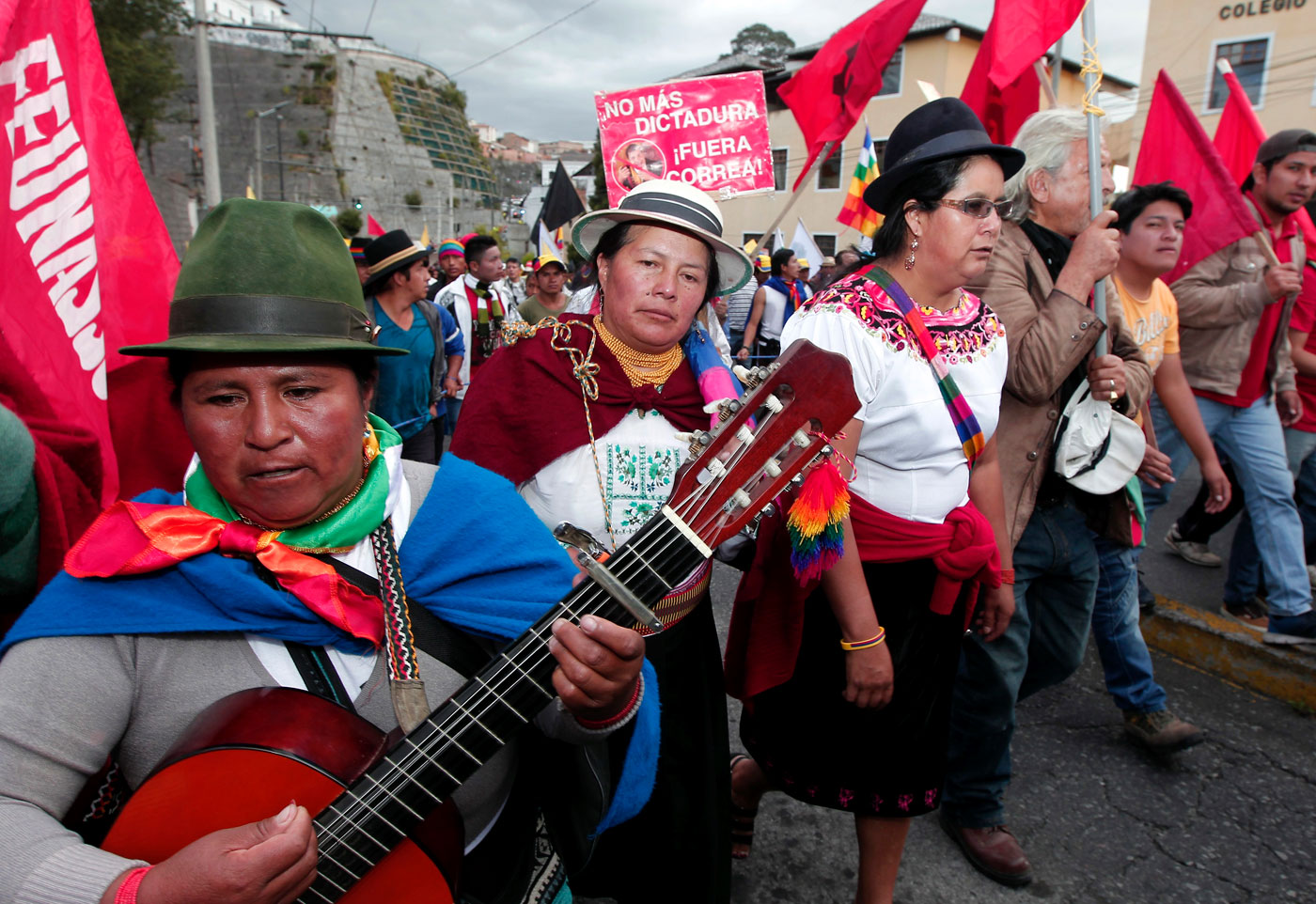In response to the revelations of wholesale tax evasion in the Panamanian tax haven, Oxfam International launched an international campaign advocating for the eradication of tax havens and fiscal opacity.
Ecuadorian President Rafael Correa, has become the first head of state to actively sign, endorse and promote Oxfamās letter and campaign. The Ecuadorian leader has reaffirmed his commitment to push the changes advocated by the campaign from his position as president.
Rafael Correa
Ecuadorean President Rafael Correa spoke out on June 1 about efforts by right-wing political forces in Latin America to oust democratically-elected governments, saying that it would set a dangerous precedent for democracy in the region.
āRight-wing politicians don't just want to return to power, they want to return with a thirst for vengeance,ā said Correa during an interview with Ecuador Public Television.
Supporters of Ecuadorean President Rafael Correa ralliedĀ on April 7 in defence of his proposed tax reforms, the same day opposition-led protests were staged against them in the capital, Quito.
Thousands of government supporters gathered in Independence Plaza in front of the presidential palace to demonstrate their support for the government in light of provocations from the country's right-wing opposition.
A whole packet of new economic initiatives are set to take effect in Venezuela after socialist President Nicolas Maduro announced a series of far-reaching measures in response to the countryās economic crisis on February 17.
In a televised five hour address to the nation, Maduro explained the extent of the economic crisis afflicting the country as well as his governmentās plan to tackle it. Economic initiatives include changes to the countryās multi-tiered exchange rate, an increase in domestic petrol prices, a new tax system and expansion of community control over food distribution.
The 2016 summit of the Community of Latin American and Caribbean States (CELAC) began on January 26 with the meeting of foreign ministers and chancellors of the Latin American nations at the headquarters of the Union of South American Nations (UNASUR) in Mitad del Mundo, Quito, Ecuador.
CELAC, a regional body involving all nations in the Americas except for the United States and Canada, was officially created in Caracas in 2011 under the leadership of then-Venezuelan president Hugo Chavez.
āWe are celebrating nine years of reborn hope, of fulfilled promises and of homeland for all,ā Ecuadorean President Rafael Correa told crowds at an event marking the ninth anniversary of the start of the country's āCitizen's Revolutionā.
 Thousands rally in support of Ecuador's government in Quito's Plaza Grande, November 11. Photo: TeleSUR / Ryan Mallett-Outtrim.
Thousands of supporters of left-wing President Rafael Correa rallied in central Quito on November 11 in the face of renewed opposition protests.
āCorrea has done so many things for our country,ā Correa supporter Rosa Chiquimarea told TeleSUR English.
Thousands rally in support of Ecuador's government in Quito's Plaza Grande, November 11. Photo: TeleSUR / Ryan Mallett-Outtrim.
Thousands of supporters of left-wing President Rafael Correa rallied in central Quito on November 11 in the face of renewed opposition protests.
āCorrea has done so many things for our country,ā Correa supporter Rosa Chiquimarea told TeleSUR English.
āFor now, we are discussing a problem left to us by capitalism - climate change.ā This was the conclusion of Bolivian President Evo Morales in his closing remarks to the October 10-12 World People's Conference on Climate Change and the Defence of Life in Cochabamba.
More than 5000 people from more than 40 countries took part in the summit, established to give a voice to the poor and marginalised victims of climate change. Proposals and demands agreed on at the summit will be taken directly to the United Nations climate talks in Paris starting on November 30.
 Indigenous anti-Correa protesters.
Ecuadorās President Rafael Correa is facing the most important challenge yet to his self-styled āCitizens' Revolutionā.
A range of indigenous groups, trade unions and leftist parties mobilised across the country on August 13. Their long list of demands included calls for land reform, opposition to mining, support for bilingual education and the shelving of the governmentās proposed water and labour laws.
Indigenous anti-Correa protesters.
Ecuadorās President Rafael Correa is facing the most important challenge yet to his self-styled āCitizens' Revolutionā.
A range of indigenous groups, trade unions and leftist parties mobilised across the country on August 13. Their long list of demands included calls for land reform, opposition to mining, support for bilingual education and the shelving of the governmentās proposed water and labour laws.
More than 6000 people and 500 group have participated in public meetings on a proposed land law with the government of President Rafael Correa.

Ecuadorian President Rafael Correa and social movements behind Ecuadorās āCitizens' Revolutionā are engaged in yet another battle against the South American country's entrenched elites.
Supporters of Correa marched through the capital of Quito on August 12 to the presidential palace, where they intend to maintain a permanent presence to help defend the elected government.
The next day, violent opposition protests led to 86 police officers being injured, the interior ministry said, along with 20 civilians and three members of the press.
- Previous page
- Page 3
- Next page








